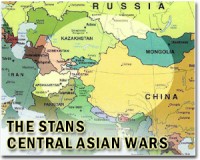 |
Kirkuk, Iraq (AFP) Dec 12, 2010 Insurgents kidnapped the sister-in-law of a top Kurdish policeman in an apparent bid to release jailed detainees in the ethnically mixed northern Iraqi city of Kirkuk, police said on Sunday. Kirkuk's provincial police chief attributed the kidnapping in the oil-rich city on the release from jail nearly two months ago of five women linked to Al-Qaeda, which he admitted had been a "mistake." Late on Saturday, four gunmen in military uniform stormed into the home of Hamid Taher al-Barazanji, a policeman whose brother, Colonel Mohammed Taher al-Barazanji, heads the Kirkuk police's internal affairs division. The gang handcuffed Barazanji and covered his mouth with masking tape before kidnapping his 25-year-old wife Haifa Abdul Saheb, a police officer said on condition of anonymity. The officer added that Kirkuk police believed an Islamist group, Ansar al-Sunna, was behind the kidnapping. "Criminals are trying to arouse sectarian feelings in the Kirkuk community," provincial police chief Major General Jamal Taher Bakr told AFP as he confirmed the kidnapping. He tied the abduction to the October 28 release of five jailed women linked to Al-Qaeda in exchange for two kidnapped Kurdish sisters, as part of a bid to curb violence in the city. Barazanji was involved in negotiations which led to the exchange. "The police cannot exchange detainees for people who have been kidnapped, because it encourages terrorism," Bakr said. "The exchange of the five women who were released in October was a mistake." Police had earlier said that two hours after Saheb's kidnap, another group of armed men kidnapped a Sunni tribal sheikh and his daughter in a village 35 kilometres (20 miles) south of Kirkuk. But Kirkuk deputy provincial police chief Brigadier General Torhan Yusuf told AFP later on Sunday that the pair had been briefly detained by several plain-clothes policemen who worked in Kirkuk's internal affairs division and released shortly thereafter. Kirkuk is an oil-rich province that is home to a tense and fragile mix of Kurds, Sunni Arabs, Turkmen, Shiites and Christians. Iraq's autonomous Kurdish region wants to incorporate the bordering province into its territory, a claim which the Baghdad central government rejects.
earlier related report Speaking at a congress of his Kurdistan Democratic Party, Barzani said "the issue of self-determination," which was considered "a right," would be presented to those attending the conference "to be studied and discussed." The remarks mark the first time Barzani has officially presented the issue to the KDP's congress, which opened on Saturday. His comments were made to an audience that included Iraq's Prime Minister-designate Nuri al-Maliki, parliament speaker Osama al-Nujaifi and Iyad Allawi, whose Iraqiya bloc won the most seats in March elections. Maliki, who was awarded the premiership on November 25, has two more weeks in which he must form a cabinet. Barzani's KDP is a key member of Maliki's governing coalition, and the Kurdish leader played a major role in bringing Iraq's divided political factions together to agree a power-sharing deal. Iraq's Kurdish north, made up of three provinces, has its own parliament and exerts control over all areas of policy except for national defence and foreign affairs. It is currently in dispute with Iraq's central government in Baghdad over two main issues: a land dispute centred around the oil-rich city of Kirkuk; and the distribution of revenues from the region's energy reserves. Arbil claims Kirkuk and parts of three neighbouring provinces, and has attempted signing its own deals with international energy firms without consulting Baghdad, both of which central government authorities contest. The region first attained a modicum of autonomy in 1974, but Barzani's father and then-leader of the KDP, Mulla Mustafa Barzani, returned to war with the Baghdad government rather than accept that limited autonomy. Kurdistan won greater freedom after the 1991 Gulf War, but Barzani and the region's other dominant political leader Jalal Talabani, now Iraq's president, waged war for control of smuggling routes that provided valuable tariff revenue while dictator Saddam Hussein was still in power. A power-sharing deal was eventually struck between their two blocs and today, Barzani is seen as the dominant part of the pair.
Share This Article With Planet Earth
Related Links News From Across The Stans
 Investing in Afghanistan and Iraq
Investing in Afghanistan and IraqWashington (UPI) Dec 10, 2010 U.S. investors and other foreign companies continue to shy away from investing in Afghanistan and Iraq because of security and infrastructure problems as well as government corruption, a critical shortcoming in the two countries' efforts to grow their economies and increase stability. "Security is essential to economic and business development," said Ethan B. Kapstein, a professor of in ... read more |
|
| The content herein, unless otherwise known to be public domain, are Copyright 1995-2010 - SpaceDaily. AFP and UPI Wire Stories are copyright Agence France-Presse and United Press International. ESA Portal Reports are copyright European Space Agency. All NASA sourced material is public domain. Additional copyrights may apply in whole or part to other bona fide parties. Advertising does not imply endorsement,agreement or approval of any opinions, statements or information provided by SpaceDaily on any Web page published or hosted by SpaceDaily. Privacy Statement |